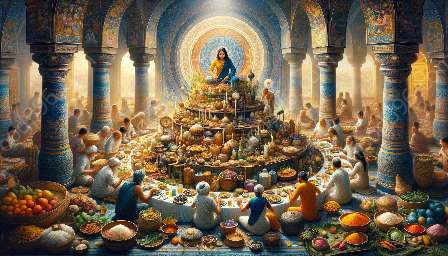Food plays a crucial role in religious ceremonies, serving as a symbol of divine blessings, community unity, and spiritual transformation. Across different religious traditions, food symbolism and rituals are deeply intertwined with cultural practices and historical contexts, reflecting the multifaceted connections between food and spirituality.
The Role of Food in Religious Ceremonies
In many religious traditions, the act of sharing food holds deep symbolic significance. The communal consumption of food during religious rituals often symbolizes sharing divine blessings and fostering a sense of unity among the participants. For example, in Christian Eucharistic celebrations, the sharing of bread and wine represents the spiritual nourishment and unity within the community of believers.
Additionally, food is employed as a means of expressing gratitude and reverence towards the divine. Offerings of food in various religious ceremonies convey a sense of devotion and acknowledgment of the divine providence. The careful selection and preparation of these offerings underscore the importance of food not only as a physical sustenance but also as a vehicle for spiritual expression.
Food Symbolism and Rituals
Food symbolism in religious ceremonies encompasses a wide range of meanings, often tied to the spiritual teachings and narratives within each tradition. Across cultures, specific foods may be imbued with symbolic meanings that reflect aspects of creation, transformation, and redemption. For instance, in Hindu rituals, the offering of grains and fruits symbolizes the offering of life's sustenance to the divine, reflecting the interconnectedness between the physical and spiritual realms.
Rituals surrounding food also serve as powerful expressions of religious identity and cultural heritage. The preparation and consumption of specific foods during religious observances are often deeply rooted in historical traditions, reflecting the enduring influence of food culture on religious practices. These rituals provide individuals with a tangible connection to their cultural heritage, fostering a sense of continuity and shared identity within the community.
Food Culture and History
The significance of food in religious ceremonies is inseparable from the broader cultural and historical contexts in which these traditions have evolved. Food culture, encompassing traditional cuisines, culinary practices, and dietary customs, plays a vital role in shaping religious rituals and observances. Historical events, migration patterns, and agricultural practices have all contributed to the development of distinct food cultures within religious communities.
Furthermore, the historical narratives and mythologies surrounding food in religious traditions offer valuable insights into the cultural values and beliefs of these communities. Legends and scriptures often depict food as a source of nourishment, healing, and sustenance, reflecting the interconnectedness of food with spiritual well-being and communal harmony.
Conclusion
Exploring the symbolic significance of food in religious ceremonies reveals the intricate connections between food symbolism, rituals, culture, and history. Through the lens of food, individuals can experience the spiritual essence of their religious traditions and engage with the rich tapestry of cultural and historical influences that have shaped these practices. The diverse and profound meanings attributed to food in religious ceremonies underscore its central role as a conduit for spiritual expression, communal unity, and cultural continuity.

